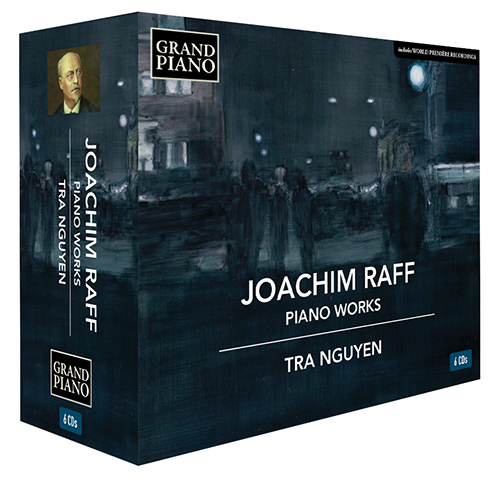
About this Release
Catalogue No.: GP728X
Release Date: November 2015
Barcode: 747313972821
Composer(s): Joachim Raff
Artist(s): Tra Nguyen
RAFF, JOACHIM (1822–1882)
Piano Works (6-CD Boxed Set)
- Tra Nguyen, piano
Joachim Raff (1822-1882) was regarded by his contemporaries as one of the foremost symphonists of his age, but in his extensive oeuvre of 329 compositions over half of them are for the piano. This selection of 21 works offers a cross section of the best of this large catalogue for the instrument, chosen by acclaimed Raff interpreter Tra Nguyen to showcase the varied aspects of his art. Raff’s melodic generosity, his piquant harmonic sensibility and ravishing textures are all on display in these pieces which span the whole of his career, from the exuberant Douze Romances to the majestic Grande Sonate.
Tracklist
Disc 1
|
Frühlingsboten, Op. 55 (1852) (01:16:00 )
|
|
1
I. Winterruhe: Andantino (00:01:54)
|
|
2
II. Fruhlingsnahen: Allegro non troppo, deciso (00:04:35)
|
|
3
III. Gelubde: Grave (00:03:51)
|
|
4
IV. Unruhe: Allegro (00:01:52)
|
|
5
V. Annaherung: Andantino (00:02:45)
|
|
6
VI. Wirrniss: Vivace (00:02:23)
|
|
7
VII. Vorwurf: Andante non troppo (00:04:07)
|
|
8
VIII. Fern: Andantino (00:01:56)
|
|
9
IX. Frohe Kunde: Presto (00:02:27)
|
|
10
X. Zu zwei: Andante (00:02:34)
|
|
11
XI. Ohne Ruh': Allegro (00:02:57)
|
|
12
XII. Abends: Larghetto (00:04:09)
|
|
3 Klavier-Soli, Op. 74 (1852) (00:41:00 )
|
|
13
No. 1. Ballade: Andantino, quasi larghetto (00:10:33)
|
|
14
No. 2. Scherzo: Presto (00:06:11)
|
|
15
No. 3. Metamophosen: Andante (00:12:24)
|
|
16
Fantasie in B Major, WoO 15A (1852) (00:12:09)
|
Disc 2
|
Fantasie-Sonate, Op. 168 (1871) (00:17:41 )
|
|
1
I. Allegro patetico (00:06:47)
|
|
2
II. Largo (00:05:56)
|
|
3
III. Allegro molto (00:04:42)
|
|
Variationen uber ein Originalthema, Op. 179 (1873) (00:32:23 )
|
|
4
Andante (00:01:02)
|
|
5
Thema (00:00:40)
|
|
6
Variation 1: L'istesso tempo (00:00:39)
|
|
7
Variation 2: L'istesso tempo (00:00:34)
|
|
8
Variation 3: Allegro assai (00:00:24)
|
|
9
Variation 4: L'istesso tempo (00:00:29)
|
|
10
Variation 5: Meno mosso (00:00:49)
|
|
11
Variation 6: L'istesso tempo (00:00:45)
|
|
12
Variation 7: L'istesso tempo (00:00:47)
|
|
13
Variation 8: Tranquillo (00:01:01)
|
|
14
Variation 9: L'istesso tempo (00:00:55)
|
|
15
Variation 10: Velace leggiero (00:00:47)
|
|
16
Variation 11: L'istesso tempo (00:01:08)
|
|
17
Variation 12: Più mosso (00:01:15)
|
|
18
Variation 13: Moderato (00:00:55)
|
|
19
Variation 14: Moderato (00:01:42)
|
|
20
Variation 15: Allegro molto (00:00:51)
|
|
21
Variation 16: L'istesso tempo (00:00:58)
|
|
22
Variation 17: L'istesso tempo (00:00:52)
|
|
23
Variation 18: Adagio (00:02:57)
|
|
24
Variation 19: Doppio movimento (00:01:41)
|
|
25
Variation 20: Doppio movimento (00:01:28)
|
|
26
Finale: Moderato maestoso (00:04:00)
|
|
4 Pieces, Op. 196 (1875) (00:19:06 )
|
|
27
No. 1. Im Schilf (00:05:07)
|
|
28
No. 2. Berceuse (00:03:20)
|
|
29
No. 3. Novelette (00:04:51)
|
|
30
No. 4. Impromptu (00:05:45)
|
Disc 3
|
Album lyrique, Op. 17 (1849 version) (1845) (00:46:54 )
|
|
1
Volume 1: No. 1. Reverie: Larghetto rubato (00:04:08)
|
|
2
Volume 1: No. 2. Reverie: Lento (00:04:11)
|
|
3
Volume 1: No. 3. Reverie: Andante con moto, quasi allegretto (00:04:09)
|
|
4
Volume 2: No. 4. Romance: Moderato (00:04:33)
|
|
5
Volume 2: No. 5. Ballade: Allegro (00:04:37)
|
|
6
Volume 3: No. 6. Nocturne: Lento (00:05:59)
|
|
7
Volume 3: No. 7. Nocturne: Larghetto (00:04:49)
|
|
8
Volume 4: No. 8. Scherzo: Allegro (00:05:22)
|
|
9
Volume 5: No. 9. Introduction and Fugue: Allegro (00:09:04)
|
|
5 Eglogues, Op. 105 (1861) (00:18:26 )
|
|
10
No. 1. Allegro molto (00:04:20)
|
|
11
No. 2. Andante con moto (00:04:22)
|
|
12
No. 3. Andante quasi larghetto (00:03:57)
|
|
13
No. 4. Andante mosso (00:02:39)
|
|
14
No. 5. Presto giojoso (00:03:06)
|
|
15
Impromptu-valse, Op. 94 (1860) (00:04:15)
|
|
16
Fantaisie-polonaise, Op. 106 (1861) (00:07:02)
|
Disc 4
|
La cicerenella, Op. 165 (1871) (00:08:17 )
|
|
1
Presto (Capriccioso) - La Cicerenella - Variation 1 (00:01:48)
|
|
2
Variation 2 (00:00:28)
|
|
3
Variation 3 (00:00:25)
|
|
4
Variation 4 (00:00:26)
|
|
5
Variation 5 (00:00:36)
|
|
6
Variation 6 (00:00:20)
|
|
7
Variation 7 (00:00:23)
|
|
8
Variation 8: Più mosso (00:00:20)
|
|
9
Variation 9: Ancora più mosso (00:00:26)
|
|
10
Variation 10: Larghetto (00:01:49)
|
|
11
Variation 11: Presto (00:00:12)
|
|
12
Variation 12 (00:00:12)
|
|
13
Variation 13 e coda - prestissimo (00:00:45)
|
|
12 romances en forme d'etudes, Op. 8 (1843) (00:36:07 )
|
|
14
No. 1. L'Abbandonata: Allegro moderato (00:02:58)
|
|
15
No. 2. Pastorale: Andante (00:02:41)
|
|
16
No. 3. Il Fuggitivo: Allegro agitato quasi presto (00:00:55)
|
|
17
No. 4. L'Amicizia: Andantino (00:02:22)
|
|
18
No. 5. Il Pianto dell' Amante: Adagio ma non troppo (00:04:51)
|
|
19
No. 6. Il Delirio: Allegro molto agitato cioe smanioso (00:02:31)
|
|
20
No. 7. Barcarola: Allegretto (00:02:41)
|
|
21
No. 8. Preghiera: Andante religioso (00:03:12)
|
|
22
No. 9. Il Gladiatori: Presto di bravura (00:01:55)
|
|
23
No. 10. Mazurka: Allegro moderato (00:03:22)
|
|
24
No. 11. La Contentezza: Andante (00:02:09)
|
|
25
No. 12. Polonaise: Alla Polacca (00:04:53)
|
|
2 pieces, Op. 166 (1871) (00:10:30 )
|
|
26
No. 1. Idylle: Andante (00:04:56)
|
|
27
No. 2. Valse Champetre: Allegro (00:05:36)
|
|
28
Allegro agitato, Op. 151 (1868) (00:05:27)
|
Disc 5
|
Grande Sonate, Op. 14 (1881) (00:34:50 )
|
|
1
I. Allegro (00:11:31)
|
|
2
II. Allegro molto (00:04:10)
|
|
3
III. Larghetto (00:10:20)
|
|
4
IV. Allegro - Animato - Più mosso (00:08:49)
|
|
Blätter und Blüten, Op. 135a (1866) (00:38:08 )
|
|
5
No. 1. Epheu: Andantino (00:03:08)
|
|
6
No. 2. Cypresse: Larghetto (00:04:31)
|
|
7
No. 3. Nelke: Presto - Molto meno mosso, quasi andantino - Tempo I (00:03:01)
|
|
8
No. 4. Lorbeer: Allegro vivace (00:03:15)
|
|
9
No. 5. Rose: Andantino, non troppo lento (00:01:56)
|
|
10
No. 6. Vergissmeinnicht: Allegro grazioso (00:04:13)
|
|
11
No. 7. Reseda: Allegretto (00:02:22)
|
|
12
No. 8. Lubine: Andante (00:03:32)
|
|
13
No. 9. Animone: Allegro (00:02:52)
|
|
14
No. 10. Immergrun: Allegretto - Un poco meno mosso - Tempo I (00:03:20)
|
|
15
No. 11. Maiglockchen: Allegretto pastorale (quasi andantino) (00:02:24)
|
|
16
No. 12. Kornblume: Presto - Un pochettino meno mosso - Come prima (00:03:34)
|
Disc 6
|
Erinnerung an Venedig, Op. 187 (1873) (00:22:20 )
|
|
1
No. 1. Gondoliera: Allegretto (00:03:20)
|
|
2
No. 2. Am Rialto: Allegro con spirito (00:03:47)
|
|
3
No. 3. Canzone: Allegretto (00:04:09)
|
|
4
No. 4. Zur Taubenfutterung: Capricietto. Allegretto (00:03:09)
|
|
5
No. 5. Serenade: Allegretto (00:03:59)
|
|
6
No. 6. Venetienne: Allegro (00:03:59)
|
|
7
Barcarolle, Op. 143 (1867) (00:07:13)
|
|
6 Poemes, Op. 15 (1845) (00:23:43 )
|
|
8
No. 1. Passion calme: Andantino (00:05:51)
|
|
9
No. 2. De loin: Andante quasi larghetto (00:03:28)
|
|
10
No. 3. Les amoureux: Allegretto quasi allegro (00:04:33)
|
|
11
No. 4. La larme: Quasi larghetto (00:02:46)
|
|
12
No. 5. Chanson Suisse: Andante (00:04:02)
|
|
13
No. 6. Gigue: Presto (00:03:09)
|
|
14
Fantaisie, Op. 142 (1867) (00:13:01)
|
|
2 Pieces, Op. 169 (1871) (00:11:57 )
|
|
15
No. 1. Romance: Quasi adagio (00:06:44)
|
|
16
No. 2. Valse brillante: Allegro (00:05:18)
|
Total Time: 07:06:32
The Artist(s)
 British-Vietnamese Tra Nguyen gave her first concert, performing Mozart’s Piano Concerto, K. 488, with the Hanoi Conservatory Orchestra. Since then she has continued to engage audiences in other important venues worldwide. Recent and future performances include Queen Elizabeth Hall, Tokyo Opera City, Hong Kong City Recital Hall, Cadogan Hall and Wigmore Hall amongst others. Her imaginative programming balances core repertoire and lesser-known music, winning critical praise. Her discography introduces many world première recordings of neglected music. Volumes 1–6 of her recordings of Joachim Raff’s piano music have earned wide critical acclaim, including Album of the Week by The Independent. Tra Nguyen studied with Lev Naumov at the Moscow Conservatory and with Christopher Elton at the Royal Academy of Music where she received the academy’s highest award for her final recital. She was awarded the ARAM (Associate of the Royal Academy of Music) for her “significant contribution to the music profession” in 2013.
British-Vietnamese Tra Nguyen gave her first concert, performing Mozart’s Piano Concerto, K. 488, with the Hanoi Conservatory Orchestra. Since then she has continued to engage audiences in other important venues worldwide. Recent and future performances include Queen Elizabeth Hall, Tokyo Opera City, Hong Kong City Recital Hall, Cadogan Hall and Wigmore Hall amongst others. Her imaginative programming balances core repertoire and lesser-known music, winning critical praise. Her discography introduces many world première recordings of neglected music. Volumes 1–6 of her recordings of Joachim Raff’s piano music have earned wide critical acclaim, including Album of the Week by The Independent. Tra Nguyen studied with Lev Naumov at the Moscow Conservatory and with Christopher Elton at the Royal Academy of Music where she received the academy’s highest award for her final recital. She was awarded the ARAM (Associate of the Royal Academy of Music) for her “significant contribution to the music profession” in 2013.
The Composer(s)
 The reputation of Joseph Joachim Raff was once so high that during the 1860s and 1870s he was regarded by many as the foremost symphonist of his day. His breakthrough came in 1863 when both his First Symphony and a cantata won major prizes. From then on his reputation rose inexorably until in 1877 he became the founding director of the prestigious Hoch Conservatory in Frankfurt. Although primarily known, then as now, as a symphonist, Raff was prolific in most genres; operas, choral works, chamber music and songs abound in his catalogue but by far his largest output was for the piano: there are over 130 works for the instrument, many of them with multiple movements or numbers.
The reputation of Joseph Joachim Raff was once so high that during the 1860s and 1870s he was regarded by many as the foremost symphonist of his day. His breakthrough came in 1863 when both his First Symphony and a cantata won major prizes. From then on his reputation rose inexorably until in 1877 he became the founding director of the prestigious Hoch Conservatory in Frankfurt. Although primarily known, then as now, as a symphonist, Raff was prolific in most genres; operas, choral works, chamber music and songs abound in his catalogue but by far his largest output was for the piano: there are over 130 works for the instrument, many of them with multiple movements or numbers. 
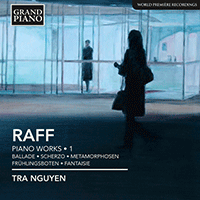
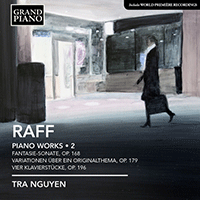
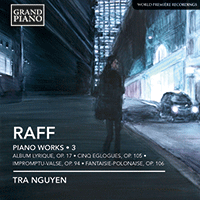
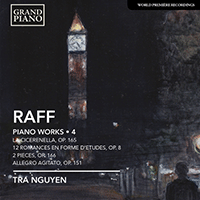
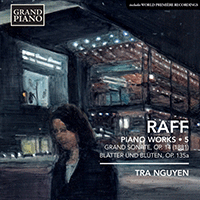
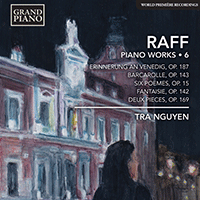
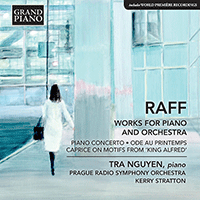
 Grand Piano has gained a reputation for producing high quality recordings of rare keyboard gems. Dedicated to the exploration of undiscovered piano repertoire, the label specialises in complete cycles of piano works by many lesser-known composers, whose output might otherwise have remained unknown and unrecorded.
Grand Piano has gained a reputation for producing high quality recordings of rare keyboard gems. Dedicated to the exploration of undiscovered piano repertoire, the label specialises in complete cycles of piano works by many lesser-known composers, whose output might otherwise have remained unknown and unrecorded.






